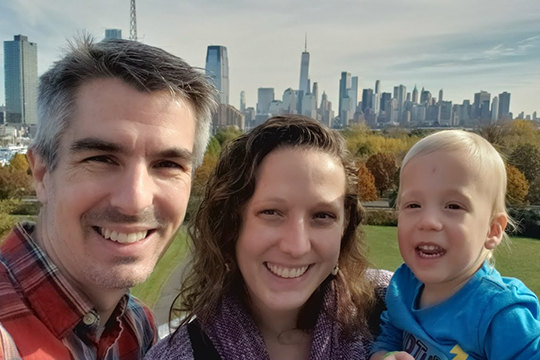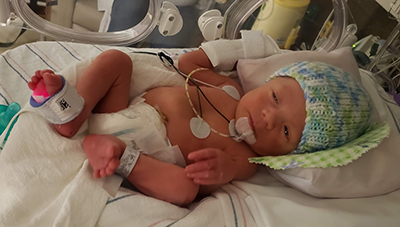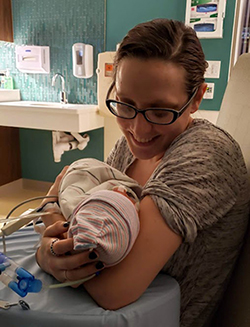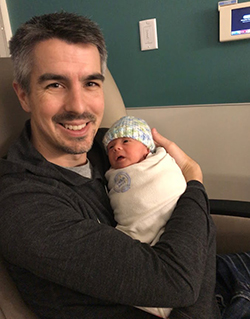We are so grateful for the amazing doctors and nurses that assisted him during his 19-day NICU stay.

“Even the smallest person can change the course of the future.” - JRR Tolkien
“This quote is mounted in my son’s bedroom. Every day when I see it, I am reminded of how much a tiny human at 4 pounds, 13 ounces, can impact you and change your life forever. My husband and I never imagined being in the Neonatal Intensive Care Unit (NICU) or having a premature baby. Throughout the majority of my pregnancy, blood test results and ultrasound scans had been normal. I did not think I would deliver early since there had been no signs of a premature birth happening.
Midway through my pregnancy, my husband and I attended a breastfeeding class at Cooperman Barnabas Medical Center. I remember clearly the part where the lactation consultant talked about how feeding NICU babies was very different. Oftentimes, premature babies were given milk through feeding tubes or small droppers. I listened to the nurse and thought to myself, this won’t apply to me. I am sure my baby will come late or right near my due date, and I just plan to breastfeed. Fast forward a month later, and this part of the breastfeeding presentation would come to be very important for helping our premature son grow, develop, and be able to graduate from the NICU.

At 32 weeks, I had my baby shower. My husband and I were grateful for the love and kindness from friends and family, but a bit nervous about all we still had to do before welcoming baby. In my mind, we still had 8 more weeks to prepare! My recent prenatal appointments had been normal, and the baby was measuring normal size during my 20-week scan. A couple days after my baby shower, I realized that I was having minor bleeding. After being examined by my gynecologist, I was sent to the PET Unit, where they explained that I was 1 cm. dilated. As I was nervously walking into the hospital, I happened to see my friend’s mother who was a nurse. She explained that I was far enough along to deliver the baby and that the doctor would most likely give me steroid shots to help the baby’s lungs. As she explained this to me, I was in shock. I thought, how can I deliver this baby? I don’t have my hospital bag packed, let alone with me!
 However, my friend’s mother calmed my nerves because she reassured me that I was in the best care. I was able to receive the steroid shots and was monitored for a few more days at the hospital. The bleeding stopped, so I was able to go home, but needed to be on bed rest. Again, I was still trying to wrap my brain around what was happening. I had not planned to begin my maternity leave for a few weeks. However, I needed to accept what was happening and focus on my health. This was the start of learning to be flexible and realizing that you cannot plan or control everything.
However, my friend’s mother calmed my nerves because she reassured me that I was in the best care. I was able to receive the steroid shots and was monitored for a few more days at the hospital. The bleeding stopped, so I was able to go home, but needed to be on bed rest. Again, I was still trying to wrap my brain around what was happening. I had not planned to begin my maternity leave for a few weeks. However, I needed to accept what was happening and focus on my health. This was the start of learning to be flexible and realizing that you cannot plan or control everything.
A few days into bedrest, I started having contractions and we headed to the hospital. This time, my husband and I brought the hospital overnight bag just in case we were going to stay while. After checking into the PET Unit, I was transferred to Labor and Delivery. The nurses were transparent and explained what would happen after I gave birth and how my baby would go to the NICU to get the care they needed. I always thought I would be afraid to give birth especially with a preemie baby. I just tried to meditate and stay calm, so that my baby would not be in distress. About 12 hours later, Everest was born at 6:59 pm, just as the nurses were doing their shift change. I was able to give my newborn a quick kiss on the cheek before he was taken to the NICU.
 For the next 3 weeks, we spent just about every day at the NICU. I was not able to breastfeed Everest in the beginning because he was on a feeding tube. We were grateful that the NICU was able to give Everest banked breast milk in the beginning days, so that he was able to get important nutrients. Eventually, Everest graduated from a feeding tube, and then a milk dropper, to a combination of bottle and breastfeeding.
For the next 3 weeks, we spent just about every day at the NICU. I was not able to breastfeed Everest in the beginning because he was on a feeding tube. We were grateful that the NICU was able to give Everest banked breast milk in the beginning days, so that he was able to get important nutrients. Eventually, Everest graduated from a feeding tube, and then a milk dropper, to a combination of bottle and breastfeeding.
Everest’s main issues were being able to suck, swallow, and breathe during feedings. He suffered from apnea of prematurity and would have periods of shallow breathing and moments when he stopped breathing. Sometimes the monitor in his NICU room would go off to indicate a change in breathing. This would make us worried. Although we wanted to welcome Everest into our home, we were nervous to take him home from the NICU when he was having these breathing issues. The doctors suggested that Everest go home from the NICU with a monitor that would record changes in breathing and his heart rate. The monitor was sometimes frustrating because Everest always had to be connected with all those wires. We had to cut holes in his clothes to allow the wires to come through and sometimes there would be false alarms in the middle of the night. After about 6 weeks, Everest no longer needed the monitor. He had outgrown his apnea and was doing much better breathing and gaining weight from feedings.
When we look at Everest now, at 2 ½ years old, it is easy to forget the struggles he had. He eats, drinks, and breathes without any issues. We are so grateful for the amazing doctors and nurses that assisted him during his 19-day NICU stay. As first time parents, we learned so much valuable information from the NICU staff and felt completely supported during our journey.
Today, I stay connected to the NICU by volunteering as a member of the Family Advisory Council. I have enjoyed giving back to the NICU doctors, nurses, babies, and their families as well as the sense of the community with the other NICU graduate parents. Although our NICU stay ended over 2 years ago, our family will always have a deep connection to the NICU for many years to come.” –Amy Rowe
Learn more and take a virtual tour of our maternity center.